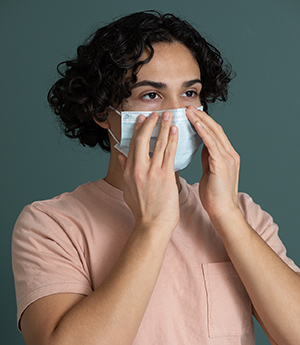COVID-19: Vaccines and Prevention
You can protect yourself, your household, and your community from severe illness from COVID-19. The best prevention is to get vaccinated. COVID-19 vaccines are available for people 6 months of age and older, including. pregnant and breastfeeding people. You should also avoid contact with anyone infected with the SARS-CoV-2 virus and follow CDC masking, handwashing, and quarantine precautions.
Vaccines help prevent COVID-19 and reduce the severity of illness if you do get the virus. No vaccine is ever 100% effective in preventing any illness, but the COVID-19 vaccines work well and are safe. Talk with your healthcare provider about your risks and which vaccine may be best for you and your family.
COVID-19 vaccines are given as a shot (injection) into the muscle. CDC recommends the 2023–2024 updated COVID-19 vaccines: Pfizer-BioNTech, Moderna, or Novavax, to protect against serious illness from COVID-19. Vaccine recommendations are based on age, time since the last dose, and in some cases, the first vaccine received. Talk with your healthcare provider about which vaccine is best for you and your family.
Take precautions: Know your community
Know about the impact of COVID-19 in your area. Follow local instructions about being in public. Be aware of events in your community that may be postponed or canceled, such as school and sporting events. You may be advised not to attend public gatherings.
To prevent possible COVID-19 exposure, you may want to stay away from crowded areas and keep adequate space between yourself and others. Move events outdoors instead of inside, if possible. You are less likely to be infected with COVID-19 during outdoor activities because the virus does not build up in the air outdoors as much as it does indoors. See the CDC website for COVID-19 prevention actions.
Follow your community's mask guidance. Wear a high-quality, well-fitted mask as advised. See the CDC website about mask use.
Stay informed about COVID-19 travel guidelines in your area, such as mask requirements in public areas. Even if you are fully vaccinated, don't travel if you have COVID-19 symptoms, have tested positive for COVID-19, or are awaiting the results of a COVID-19 test. Be aware of the most current CDC travel advice .
Know when to get tested for COVID-19. See the CDC testing website to learn about testing at the right time. If you have COVID-19 symptoms, test right away.
Safety precautions
-
Wash your hands often. Use soap and clean, running water and scrub for at least 20 seconds.
-
Stay informed about all safety instructions in your area.
-
Be aware of high-touch public surfaces such as doorknobs and handles, cabinet handles, and light switches. If you touch these surfaces, try touching them using a tissue or paper towel.
-
If you don't have access to soap and water, use an alcohol-based hand sanitizer often. Make sure it has at least 60% alcohol.
-
Don't touch your eyes, nose, or mouth unless you have clean hands.
-
Don’t kiss someone who is sick.
-
If you need to cough or sneeze, do it into a tissue. Then throw the tissue into the trash. If you don't have tissues, cough or sneeze into the bend of your elbow.
-
Clean frequently touched home surfaces often with disinfectant. This includes desk surfaces, printers, phones, kitchen counters, tables, fridge door handle, bathroom surfaces, and any soiled surface. Closely follow disinfectant label instructions.
-
Make a plan for childcare, work, and ways to stay in touch with others. Know who will help you if you get sick.
Wear a mask if advised. Masks can help protect you and others from COVID-19. See the CDC's mask guidance.

If you have been exposed to a person with COVID-19
The risk of getting COVID-19 is lower after exposure if you are fully vaccinated. Vaccines also reduce the risk of getting severe disease if you get infected. If you've been exposed to someone with COVID-19, follow these steps regardless of your vaccine status or if you've had a previous COVID-19 infection.
-
Wear a mask when you are around others inside your home or indoors in public as soon as you find out you were exposed.
-
Keep wearing a mask for 10 full days after you have been exposed.
-
Watch for symptoms such as fever, cough, and shortness of breath. If you develop symptoms, isolate in your home away from others right away and test right away. Stay home until you have your test results.
-
Take a COVID-19 test as advised by your healthcare provider or the CDC. Test even if you don't have symptoms. If you test positive, stay away from others.
When to call your healthcare provider
Call your healthcare provider if you think you have COVID-19 symptoms. These can include:
-
Fever
-
Cough
-
Nasal congestion
-
Trouble breathing
-
Body aches
-
Headache
-
Chills
-
Sore throat
-
Loss of taste or smell
-
Diarrhea
Follow your healthcare provider's specific instructions. If you are at risk of getting severe COVID-19 and being hospitalized, don't delay calling your provider. There are medicines and treatments that can be started to reduce serious COVID-19.
Do I still need a flu shot?
It's especially important to keep up on recommended vaccines for other illnesses. This is true if you're at higher risk for severe illness from COVID-19, the flu, or pneumonia. This includes older adults and those who have long-term (chronic) health conditions. Getting a yearly flu vaccine is advised for everyone 6 months old and older, with rare exceptions. Health experts advise the flu vaccine to protect you and others. COVID-19 vaccines can be given at the same time as other vaccines.
Last modified date: 3/8/2024